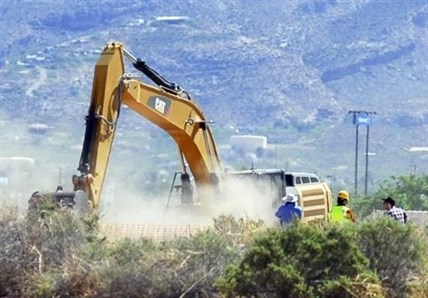
Crews begin digging at the old Alamogordo, N.M., landfill on Friday April 25, 2014, to search for copies of the Atari game "E.T. The Extraterrestrial" purportedly buried there in the 1980s. The game is considered among gamers to be one of the worst ever and is believed to have contributed to the demise of Atari.
Image Credit: AP Photo/Alamagordo Daily News, John Bear
April 27, 2014 - 8:27 AM
ALAMOGORDO, N.M. - A documentary film production company has found buried in a New Mexico landfill hundreds of the Atari "E.T." game cartridges that some call the worst video game ever made.
Film director Zak Penn showed one "E.T." cartridge retrieved from the site and said that hundreds more were found in the mounds of trash and dirt scooped by a backhoe.
About 200 residents and game enthusiasts gathered early Saturday in southeastern New Mexico to watch backhoes and bulldozers dig through the concrete-covered landfill in search of up to a million discarded copies of "E.T. The Extraterrestrial" that the game's maker wanted to hide forever.
"I feel pretty relieved and psyched that they actually got to see something," said Penn as members of the production team sifted through the mounds of trash, pulling out boxes, games and other Atari products.
Most of the crowd left the landfill before the discovery, turned away by strong winds that kicked up massive clouds of dust mingled with garbage. By the time the games were found, only a few dozen people remained. Some were playing the infamous game in a make-shift gaming den with a T.V. and an 1980's game console in the back of a van, while others took selfies beside a life-size E.T. doll inside a DeLorean car like the one that was turned into a time machine in the "Back To The Future" movies.
Among the watchers was Armando Ortega, a city official who back in 1983 got a tip from a landfill employee about the massive dump of games.
"It was pitch dark here that night, but we came with our flashlights and found dozens of games," he said. They braved the darkness, coyotes and snakes of the desert landfill and had to sneak past the security guard. But it paid off.
He says they found dozens of crushed cartridges that they took home and were still playable in their game consoles.
The game and its contribution to the demise of Atari have been the source of fascination for video game enthusiasts for 30 years. The search for the cartridges will be featured in an upcoming documentary about the biggest video game company of the early '80s.
Xbox Entertainment Studios is one of the companies developing the film, which is expected to be released later this year on Microsoft's Xbox game consoles.
Whether — and most importantly, why — Atari decided to bury thousands or millions of copies of the failed game is part of the urban legend and much speculation on Internet blog posts and forums.
Kristen Keller, a spokeswoman at Atari, said "nobody here has any idea what that's about." The company has no "corporate knowledge" about the Alamogordo burial. Atari has changed hands many times over the years, and Keller said, "We're just watching like everybody else."
Atari currently manages about 200 classic titles such as Centipede and Asteroids. It was sold to a French company by Hasbro in 2001.
A New York Times article from Sept. 28, 1983, says 14 truckloads of discarded game cartridges and computer equipment were dumped on the site. An Atari spokesman quoted in the story said the games came from its plant in El Paso, Texas, some 80 miles (130 kilometres) south of Alamogordo.
Local news reports from the time said that the landfill employees were throwing cartridges there and running a bulldozer over them before covering them with dirt and trash.
The city of Alamogordo agreed to give the documentarians 250 cartridges or 10 per cent of the cartridges found, whichever is greater.
Alamogordo Mayor Susie Galea said finding something in the landfill might bring more tourists to this city in southeastern New Mexico that is home to an Air Force base and White Sands National Monument. "Lots of people just pass through, unfortunately," she said.
The "E.T." game is among the factors blamed for the decline of Atari and the collapse in the U.S. of a multi-million dollar video game industry that didn't bounce back for several years.
Tina Amini, deputy editor at gaming website Kotaku, said the game tanked because "it was practically broken." A recurring flaw, she said, was that the character of the game, the beloved extraterrestrial, would fall into traps that were almost impossible to escape and would appear constantly and unpredictably.
The company produced millions of cartridges, and although sales were not initially bad, the frustrating gameplay prompted an immense amount of returns. "They had produced so many cartridges that were unsold that even if the game was insanely successful I doubt they'd be able to keep up," Amini says.
Joe Lewandowski, who became manager of the 300-acre landfill a few months after the cartridge dump and has been a consultant for the documentarians, told The Associated Press that they used old photographs and dug exploratory wells to find the actual burial site.
The incidents following the burial remained a part of Alamogordo's local folklore, he said. For him, the only memories of "E.T." the game were of an awful game he once bought for his kid.
"I was busy merging two garbage companies together," he said. "I didn't have time for that."
News from © iNFOnews, 2014